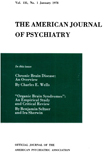SUDDEN DEATH OF A CATATONIC PATIENT RECEIVING PHENOTHIAZINE
Abstract
A case of sudden unforeseen death in a young, physically well, acutely catatonic patient has been presented. The findings at necropsy were not sufficient to explain either her death or her psychotic behavior. The terminal period was brief, lasting minutes. Contrastingly, sudden deaths in schizophrenic patients reported in the earlier literature generally were characterized by a terminal period lasting hours or days.
The role of phenothiazines in the death of our patient is uncertain. Nonetheless, one should remain alert to the possibility of massive brain-stem inhibition occurring in patients receiving large doses of phenothiazines.
The character of our patient's death closely simulates sudden death as described by several authors in physically well adults. These deaths were unrelated to medication and were considered as primarily the result of a physiologic or psychophysiologic hyperreactive state.
Access content
To read the fulltext, please use one of the options below to sign in or purchase access.- Personal login
- Institutional Login
- Sign in via OpenAthens
- Register for access
-
Please login/register if you wish to pair your device and check access availability.
Not a subscriber?
PsychiatryOnline subscription options offer access to the DSM-5 library, books, journals, CME, and patient resources. This all-in-one virtual library provides psychiatrists and mental health professionals with key resources for diagnosis, treatment, research, and professional development.
Need more help? PsychiatryOnline Customer Service may be reached by emailing [email protected] or by calling 800-368-5777 (in the U.S.) or 703-907-7322 (outside the U.S.).



